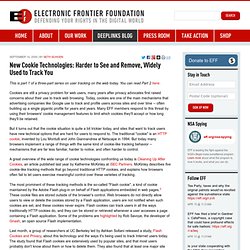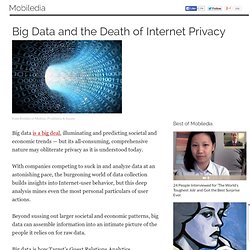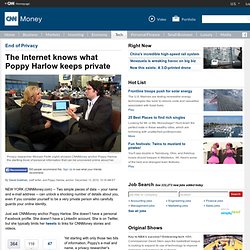

Personal Information Exposed Via Biggest U.S. Websites - Protect Your Privacy. New Cookie Technologies: Harder to See and Remove, Widely Used to Track You. This is part 1 of a three-part series on user tracking on the web today.

You can read Part 2 here. Cookies are still a privacy problem for web users, many years after privacy advocates first raised concerns about their use to track web browsing. Today, cookies are one of the main mechanisms that advertising companies like Google use to track and profile users across sites and over time -- often building up a single gigantic profile for years and years. Many EFF members respond to this threat by using their browsers' cookie management features to limit which cookies they'll accept or how long they'll be retained. But it turns out that the cookie situation is quite a bit trickier today, and sites that want to track users have new technical options that are hard for users to respond to.
A great overview of the wide range of cookie technologies confronting us today is Cleaning Up After Cookies, an article published last year by Katherine McKinley at iSEC Partners. How Advertisers Use Internet Cookies to Track You. 'Scrapers' Dig Deep for Data on the Web. Big Data and the Death of Internet Privacy. Big data is a big deal, illuminating and predicting societal and economic trends — but its all-consuming, comprehensive nature may obliterate privacy as it is understood today.

With companies competing to suck in and analyze data at an astonishing pace, the burgeoning world of data collection builds insights into Internet-user behavior, but this deep analysis mines even the most personal particulars of user actions. Beyond sussing out larger societal and economic patterns, big data can assemble information into an intimate picture of the people it relies on for raw data. Big data is how Target’s Guest Relations Analytics accidentally revealed a teenaged girl was pregnant to her father.
The store’s data collectors used information about her purchasing habits to predict her pregnancy, even though she did not explicitly reveal the information to Target (or to her father), and sent her a pamphlet about upcoming parenthood that shocked her parents. Governments and Big Data What’s Next? End of Privacy: The Web knows Poppy Harlow's personal data - Dec. 13, 2010. Privacy researcher Michael Fertik (right) showed CNNMoney anchor Poppy Harlow the startling trove of personal information that can be uncovered online about her.By David Goldman, staff writer, and Poppy Harlow, anchorDecember 13, 2010: 10:16 AM ET NEW YORK (CNNMoney.com) -- Two simple pieces of data -- your name and e-mail address -- can unlock a shocking number of details about you, even if you consider yourself to be a very private person who carefully guards your online identity.

Just ask CNNMoney anchor Poppy Harlow. She doesn't have a personal Facebook profile. She doesn't have a LinkedIn account. She is on Twitter, but she typically limits her tweets to links for CNNMoney stories and videos. Yet starting with only those two bits of information, Poppy's e-mail and name, a privacy researcher's searches across multiple online databases turned up information she found startlingly personal: Her father died of cancer at a young age.
Then, there was the more private stuff. Share this. My private life revealed on the web - Video - Technology.